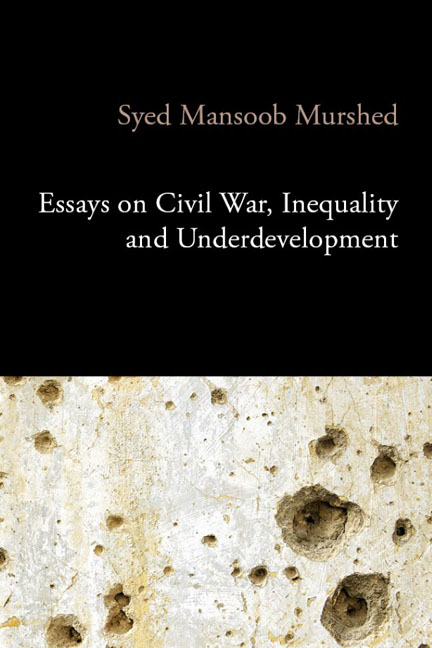Book contents
- Frontmatter
- Contents
- Preface
- Tables and figures
- 1 Conflict, civil war and underdevelopment
- 2 Revisiting the greed and grievance explanations for violent conflict
- 3 Greed, grievance and globalization
- 4 Economic dimensions of the liberal peace and its implications for conflict in developing countries
- 5 Enforcing peace agreements through commitment technologies
- 6 The conflict–growth nexus and the poverty of nations
- 7 Conflict and fiscal capacity
- 8 Does civil war hamper financial development?
- 9 The clash of civilizations and the interaction between fear and hatred
- 10 Transnational terrorism as a spillover of domestic disputes in other countries
- 11 Quantitative restrictions on the flow of narcotics: supply and demand restraints in a North–South macro-model
- 12 Spatial-horizontal inequality and the Maoist conflict in Nepal
- 13 Socioeconomic determinants of everyday violence in Indonesia: an empirical investigation of Javanese districts, 1994–2003
- 14 Not loving thy neighbour as thyself: trade, democracy and military expenditure explanations underlying India–Pakistan rivalry
- Acknowledgements
- References
- Index
7 - Conflict and fiscal capacity
Published online by Cambridge University Press: 09 January 2024
- Frontmatter
- Contents
- Preface
- Tables and figures
- 1 Conflict, civil war and underdevelopment
- 2 Revisiting the greed and grievance explanations for violent conflict
- 3 Greed, grievance and globalization
- 4 Economic dimensions of the liberal peace and its implications for conflict in developing countries
- 5 Enforcing peace agreements through commitment technologies
- 6 The conflict–growth nexus and the poverty of nations
- 7 Conflict and fiscal capacity
- 8 Does civil war hamper financial development?
- 9 The clash of civilizations and the interaction between fear and hatred
- 10 Transnational terrorism as a spillover of domestic disputes in other countries
- 11 Quantitative restrictions on the flow of narcotics: supply and demand restraints in a North–South macro-model
- 12 Spatial-horizontal inequality and the Maoist conflict in Nepal
- 13 Socioeconomic determinants of everyday violence in Indonesia: an empirical investigation of Javanese districts, 1994–2003
- 14 Not loving thy neighbour as thyself: trade, democracy and military expenditure explanations underlying India–Pakistan rivalry
- Acknowledgements
- References
- Index
Summary
Introduction
One characteristic of developing countries is low fiscal capacity and smaller government relative to the size of the economy, compared to that of richer developed countries and emerging economies (Brazil); see Table 7.1. Low fiscal capabilities constrain state capacity: the manifold functions of the state in terms of guaranteeing security, social protection, economic management and the provision of a host of other public goods. It has been argued by Tilly (1992) that for Europe, historically, state building and war making were inseparable, leading ultimately to enhanced state capacity amidst widening spheres of government activity. The purpose of this work is to empirically analyse the relationship between war, particularly in its dominant form civil war, and the fiscal capacity of the state for contemporary developing countries.
The functions of the state are important in maintaining the cohesiveness of society, and sustaining the social contract between rulers and the ruled, and different factions within society. Besides a legitimate Weberian monopoly over violence, a functioning state must be able to enforce laws, property rights and contracts, as well as have the fiscal capacity to raise revenues and provide public goods (Mill 1848). A modern state must also be able to provide a wider range of public goods (e.g., health and education), in addition to a capacity to regulate and manage markets. Economic decline in ‘failing’ states severely undermines the state's fiscal capacity, something which can make it heavily aid dependent (Ghani & Lockhart 2008). Aid dependence, in turn, can further diminish state capacity. Furthermore, a ‘failing’ state's ability to guarantee personal security, property rights and laws is often compromised, leading to the gradual privatization of violence between predatory and defensive elements within society. Individuals rely on kinship-based groups and local warlords for security and public good provision; this in turn heightens the risk of civil war as society descends towards an anarchical, Hobbesian, state of nature. In the contemporary developing world the lack of fiscal/state capacity enhances civil war risk as demonstrated by Fearon and Laitin (2003); civil war, in turn, may further attenuate fiscal capacity by destroying pre-existing fiscal institutions that used to garner revenues for the state. Thus, the lack of state capacity increases the risk of civil war.
- Type
- Chapter
- Information
- Essays on Civil War, Inequality and Underdevelopment , pp. 99 - 128Publisher: Agenda PublishingPrint publication year: 2021

